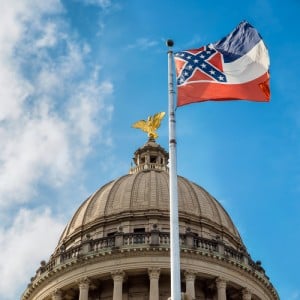Supreme Court asks for state response in case contending Mississippi flag supports white supremacy

Mississippi state flag flying outside the State Capitol Building in Jackson, Mississippi/Rob Hainer (Shutterstock.com.)
The U.S. Supreme Court is asking Mississippi to respond to a cert petition that argues the state flag’s incorporation of the Confederate battle emblem violates the equal protection rights of its black citizens.
The high court on Tuesday requested a response from Gov. Phil Bryant by Sept. 28, the Associated Press reports.
The cert petition (PDF) was filed on behalf of African-American lawyer Carlos Moore and his daughter. Moore has argued the state flag amounts to hate speech against black people and makes him feel like a second-class citizen. The New Orleans-based 5th U.S. Circuit Court of Appeals tossed the case in April, ruling that stigmatic injury without discriminatory treatment was not sufficient to give Moore standing to sue.
The cert petition asserts the flag is “symbolically expressing support for white supremacy.” While the 5th Circuit decision is “ostensibly based” on standing grounds, it is actually founded on the court’s “extraordinarily narrow and mistaken view” of the meaning of equal protection, the petition says.
“While acknowledging that the establishment clause prohibits a state from expressing the view that one religion is superior to, or preferred over, others, the court of appeals reached the remarkable and unwarranted conclusion that the equal protection clause does not similarly prohibit a state from expressing the view that one race is superior to, or preferred over, another,” the cert petition says.
Lawyers with Reed Smith are representing Moore in the Supreme Court, according to a press release.
One of the lawyers, Michael Scott, saw the Supreme Court’s request as a good sign.
“While this does not mean that the Supreme Court will take the case, it shows that they are giving serious consideration to the petition,” he told AP. “We are very pleased by this development and remain hopeful that the Supreme Court will agree that the equal protection issues we have raised are worthy of the court’s time.”
The case is Moore v. Bryant.
Hat tip to How Appealing.



